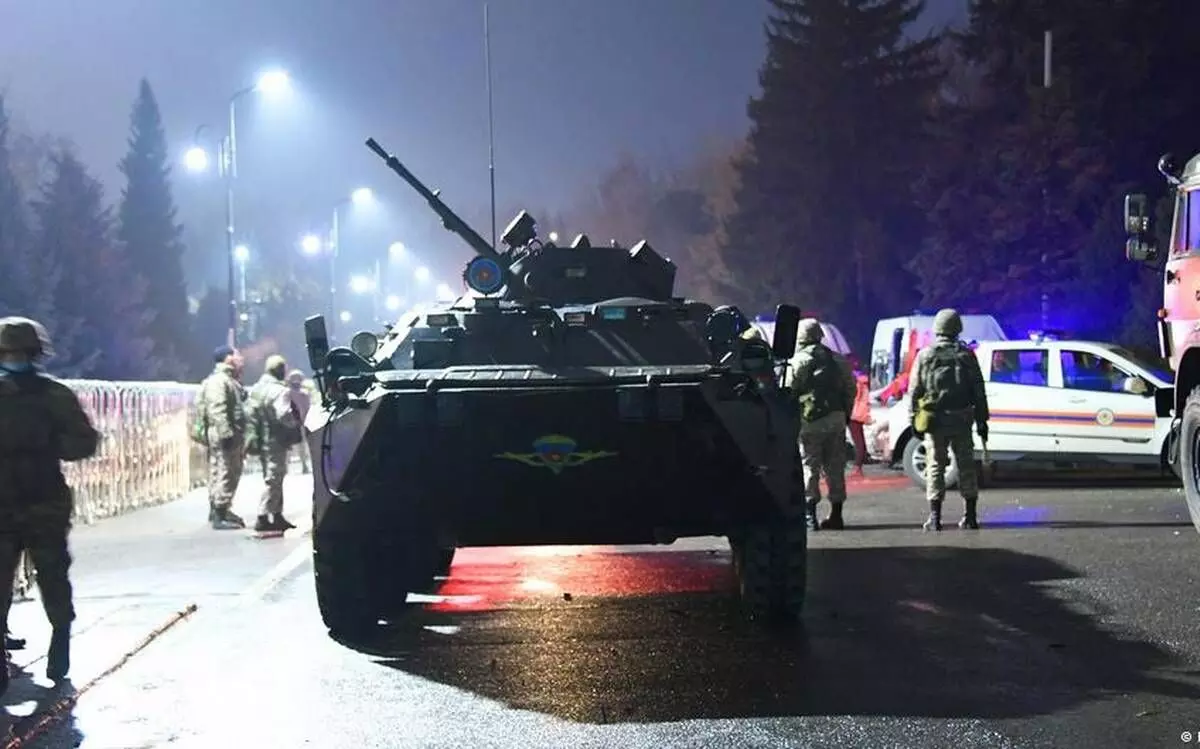
The 'fuel' behind the latest unrest in Kazakhstan that saw dozens killed
text_fieldsBy George Callaghan
On January 6, officials reported that scores of people had been shot dead by the police in Almaty. The president said on January 5 that terrorist gangs had taken over part of the city and the airport. The airport has since been retaken by the authorities.
The government says that at least 13 police officers have been killed by terrorists and over 300 police officers have been wounded. Shooting has continued in Almaty. It is doubtful that many police officers have been slain. Kazakhstan is a police state. Every police officer has a gun. It is almost impossible to obtain a gun if you are not in the security forces.
No names of dead officers have been released and no photographic evidence of demonstrators killing the police has been shown. The government may well have invented a bogus claim of policemen being killed as justificatory of the security forces then massacring defenceless demonstrators.
Protests were precipitated on New Year's Day, but fuel prices more than doubled in one day. Kazakhstan is rich in oil, gas and coal. Yet fuel is too expensive for most people who live on USD 150 a month. President Tokayev and a microscopically small proportion of the population take most of the wealth.
The much put upon denizens of Kazakhstan are irate that the president and his cronies are guilty of peculation. Huge scale defalcation for decades has been accompanied by income compression for most Kazakhs.
Kazakhstan is the 9th largest country in the world in area. It is a little smaller than Australia. The country's 19 million people are ethnic Kazakhs in 65% of cases. Most of the rest are Kazakh citizens of Russian ethnicity. Kazakhs are Sunni Muslims almost without exception. However, this is a secular state. Alcohol and pork are allowed. Polygamy is banned. Religious extremism is a crime. All places of worship are owned by the state. If the religious community irks the government, it is no longer allowed to use the mosque for orisons. People are only allowed to be religious leaders if they function as police informers.
A state of emergency has been declared all across the country. A curfew is in force. The president said that protesters were financially motivated. That is true inasmuch as they were mainly protesting about the sudden rise in the price of liquefied petroleum gas (LPG) which fuels 90% of the country's vehicles. There is resentment at Kazakhstan being an extremely unequal society, where the first president and his family are perceived to control swathes of business.
The internet had been shut down - though reports state that it has been reactivated across much of the country. Banking transactions have been frozen, with queues forming at some ATM dispensers. A temporary halt on foreign entrants to the country has been put in place too.
Kazakhstan is a member of the Collective Security Treaty Organization (CSTO) along with Russia. Nur Sultan City requested Russian military assistance. On January 6, hundreds of Russian troops were flown into Almaty to bolster the Kazakh Security Forces.
The Kazakh imbroglio is an unwelcome distraction from Ukraine for Russia. However, Moscow cannot afford to see the second-largest former Soviet republic fall into chaos or unfriendly hands. Both Kazakh and Russian official statements have referred to 'non-internal' forces at play in the protests, although there is no obvious disputing that the protests were triggered by the government releasing its cap on LPG prices. The government - a new configuration since January 5 - has already moved to reverse this release.
The government blaming the protests on a foreign plot is straight from the Soviet playbook. The government will not admit that it is facing a popular protest movement due to decades of kleptocracy and oppression. The next standard accusation in the government's arsenal is to say that demonstrators are Al Qa'eda or ISIS. The government will assume that this will blunt Western criticism of massive scale violence inflicted by the security forces on unarmed demonstrators.
Kazakhstan has seen some of the harshest restrictions during the COVID pandemic - something that has harmed the economy and caused pent-up frustration. The cost of living is thus a sensitive issue that fed acute actions leading to violence. However, to date, opposition figures, including the disgraced banker Mukhtar Ablyazov (living in France), have not claimed any direct involvement in stoking foment.
Some Kazakhs are chary about Russian troops being dispatched to their homeland. Some Russian politicians have at times doubted the legitimacy of the Kazakh State - although Russia is in a Customs Union with the country.
The author is a UK based political analyst
























